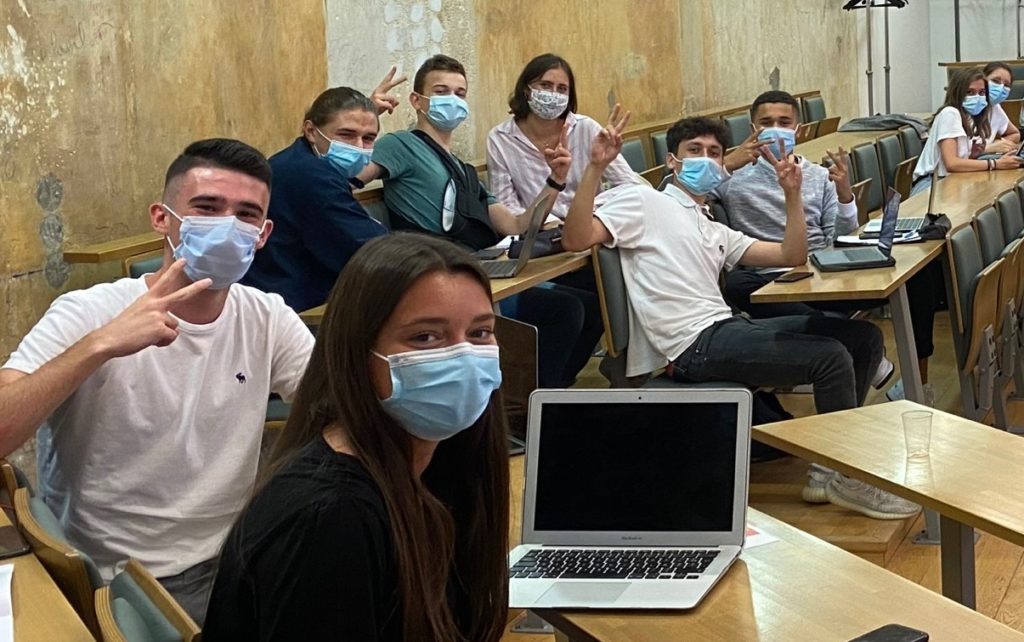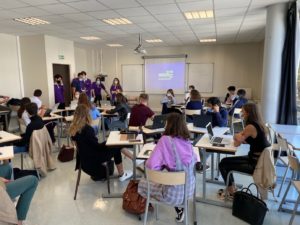
The Born Global seminar: an intensive start to the year for the new GBBA 1 students!
The Global BBA first years have returned to school! Just a few months ago, they were getting ready to sit their baccalaureate. Yet today, after just 3 days, they have become creators of innovative start-ups with an international outlook. A seminar format that really makes sense, according to Sarah Cooper, Head of the Global BBA: “There are several learning dimensions to the format we opted for this year. The first is learning to work in groups on a specific project. Throughout their studies at NEOMA and during the time they’ll spend in companies, they will need to be able to work on projects and with other people.”
 The seminar also provided the perfect opportunity to introduce the students to a range of resources that they will be using later on. These include Teams and Zoom and also a survey platform. The seminar meant that everybody became familiar with how the resources are used. “Beyond the purely “business creation” aspect, what really appealed to me was how the seminar manages to convey the values of entrepreneurship to the students. The simulation allowed them to develop their creativity as they had to solve real problems, put forward ideas, demonstrate their versatility, in short, add real value to the project and to the team,” says Sarah.
The seminar also provided the perfect opportunity to introduce the students to a range of resources that they will be using later on. These include Teams and Zoom and also a survey platform. The seminar meant that everybody became familiar with how the resources are used. “Beyond the purely “business creation” aspect, what really appealed to me was how the seminar manages to convey the values of entrepreneurship to the students. The simulation allowed them to develop their creativity as they had to solve real problems, put forward ideas, demonstrate their versatility, in short, add real value to the project and to the team,” says Sarah.
The organisation of the first 100% Start-up Lab seminar was orchestrated by Safir Hanafi, co-founder of Lok-Iz and coach with the NEOMA Incubator in Rouen. “This was a real challenge for me! Organising a seminar for a cohort of 440 students, on three different campuses, in the same week, whilst considering all the Covid-19 health and safety requirements. It was a really stimulating experience!”
The seminar was organised over 3 days on each campus:
- Day 1: design thinking: students worked on 3 feasible, profitable and innovative ideas. Then, each student had to vote for their favourite ideas via an online platform, allowing each team to identify their project’s potential.
- Day 2: go to market: students chose one idea from their three projects worked on during the previous, based on their classmates’ feedback. Then they worked on their target, the business development aspect and the acquisition strategy.
- Day 3: the art of pitching: the students worked on improving their pitch before presenting to a jury.
Every day, students attended online video lectures, in French and English, thanks to Zoom’s “simultaneous interpretation” feature. The Incubator teams would like to thank all the speakers who shared their experience and gave students the desire to embark on an entrepreneurial adventure:
- Etienne Boix (PGE14), co-founder, Quitoque : a made-in-NEOMA success story
- Inès Vanderschelden (PGE15), co-founder, Yo’Time : stress management
- Olivier Rousseau (PGE14), founder, Flycup : food tech innovations
- Philippe Blanchot (PGE17), co-founder, La Friche Gourmande : Go To Market
- Victoria Benhaim (PGE14), founder, I-LUNCH : the art of pitching
- Quentin Le Gall (PGE19), co-founder, Sauce Moutard : creative resources
- François Jolly (GBBA 09), Head of NEOMA Incubators: food tech innovations
Experienced coaches provided the students with support in the creative process over the course of the three days: Morgan Ammar (PGE18 – Cassette), Thomas Playe (PGE22 – So Far), Clément Lemaire (GBBA16 – Quiiet), Martin Crégut (PGE21 – PicMe), Dalila Hanafi, Lamia Hanafi (MSc Global Management 09 – Lok-Iz), Vincent Rouxel, Gabriel Ruff (PGE21 – PicMe), Julian Amar (PGE21 – PicMe), Samy Bouguern (MSc International Project Development 18 – Wekicks).
 “It’s been an incredible week,” says Safir. “These young students have changed enormously in just 3 days! At the beginning, they knew nothing about starting a business. Then, as they made their pitch to the jury, they were talking about development strategies, road-mapping, finance, business plans, business models and more! Some teams even created a website from out of nowhere! I am really impressed by their commitment and the quality of their work.”
“It’s been an incredible week,” says Safir. “These young students have changed enormously in just 3 days! At the beginning, they knew nothing about starting a business. Then, as they made their pitch to the jury, they were talking about development strategies, road-mapping, finance, business plans, business models and more! Some teams even created a website from out of nowhere! I am really impressed by their commitment and the quality of their work.”
A feeling echoed by Sarah: “The seminar has been a great success. It was a really motivating experience for the students, one that allowed them to settle down and enjoy themselves really quickly, which was all the more important as their alternating remote-face-to-face classes began just after the seminar.”
The Startup Lab is enthusiastic about repeating the experience with the other NEOMA programmes in a bid to encourage students to embark on an entrepreneurial adventure and provide them with the resources they will need to develop their projects.
Share on Facebook Share on Twitter Share on Pinterest